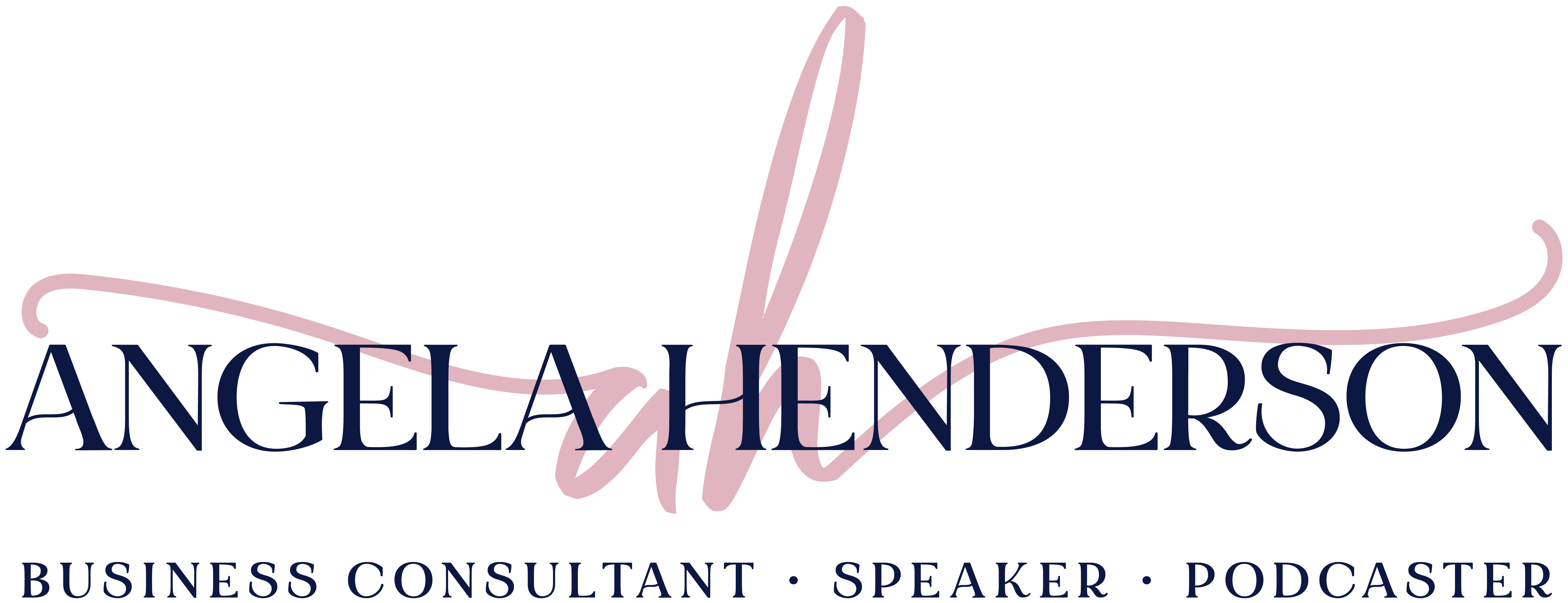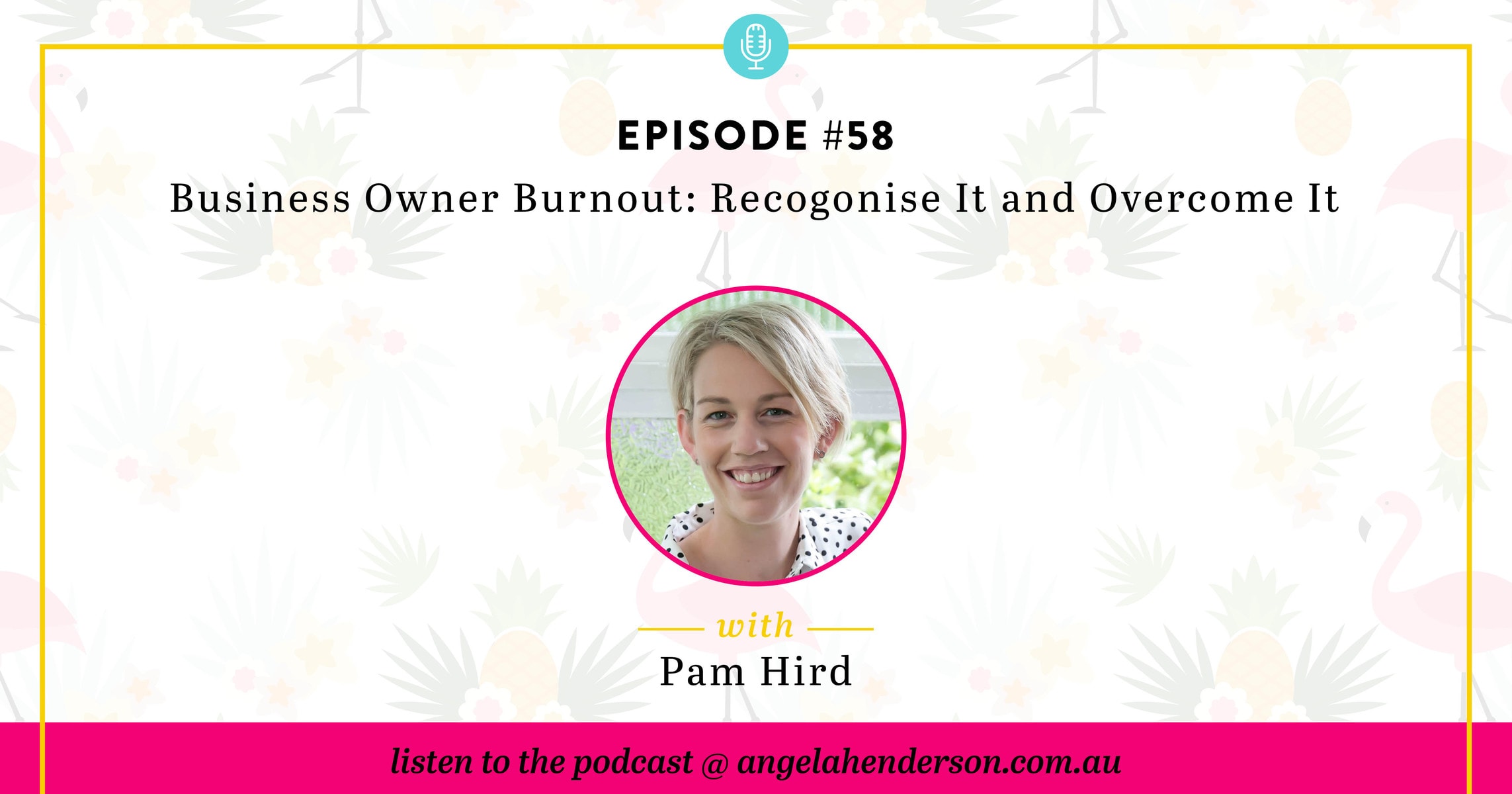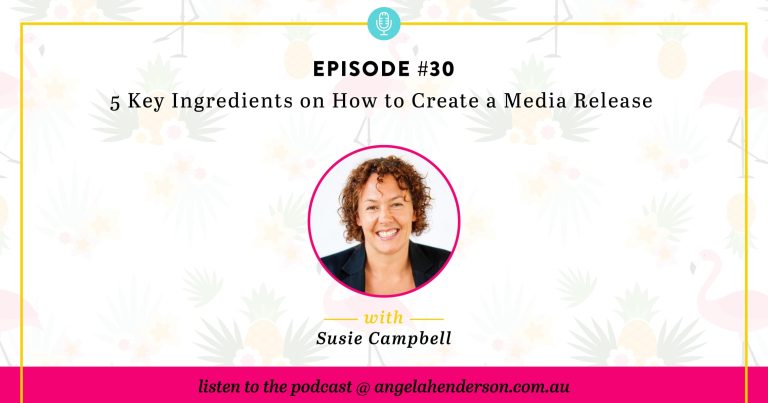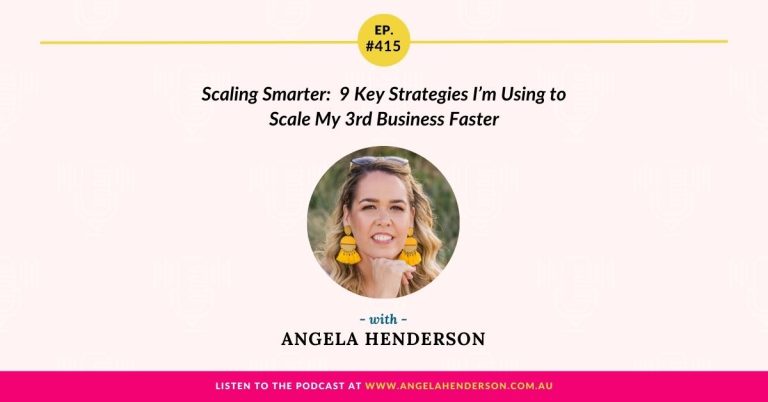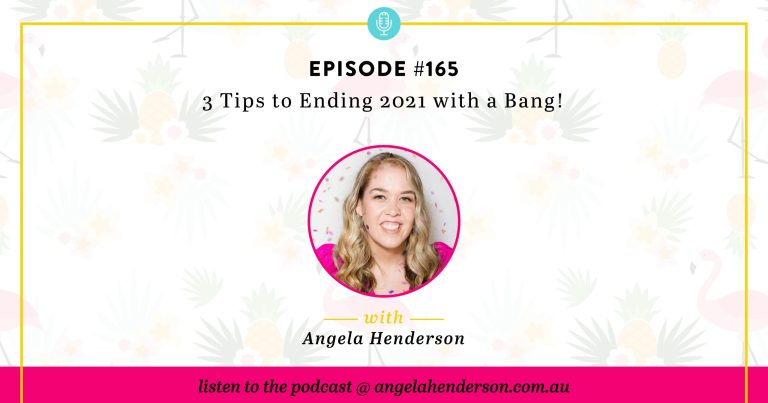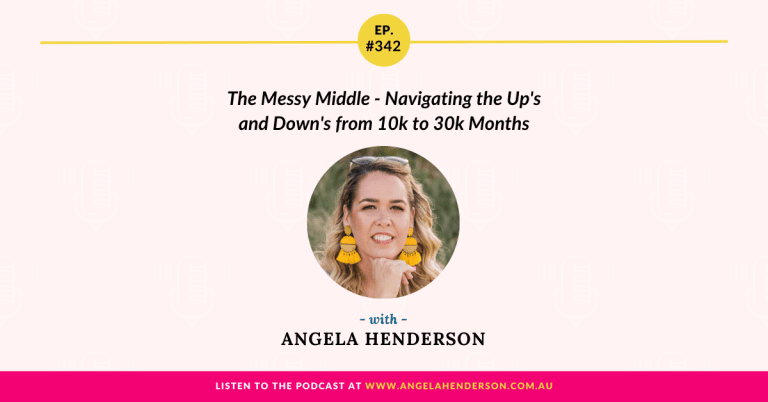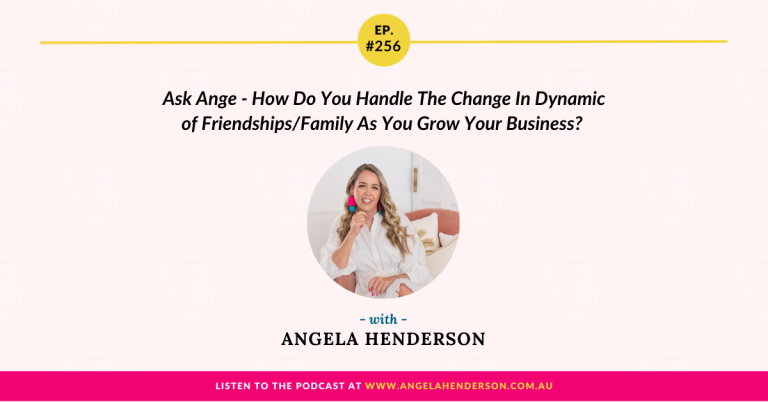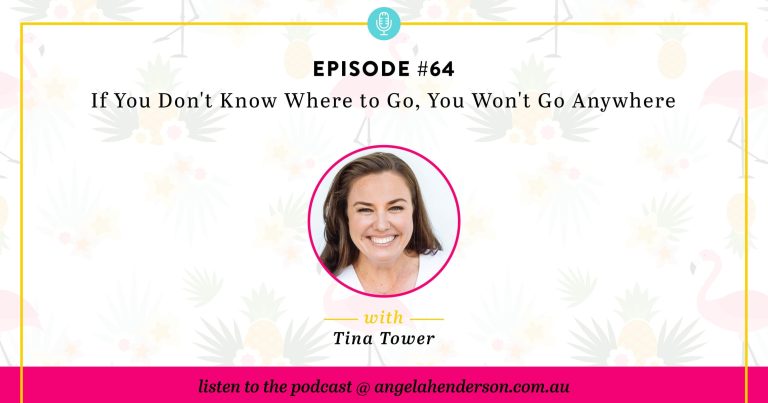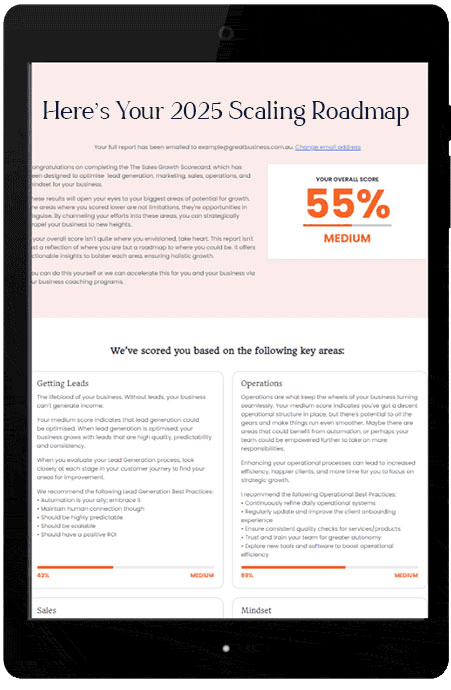In Episode 58 of the Business & Life Conversations Podcast, Pam Hird, a qualified and accredited Naturopath, Nutritionist, Herbalist and Personal Trainer, joins us today as we talk about what many business owners go through at some point in their business journey – burnout AKA adrenal fatigue. Pam will share her expertise and tell us more about adrenal fatigue – what it is, how to recognize it, the symptoms, and the stages of adrenal fatigue. We also talk about how gut health affects adrenal fatigue and, most importantly, the top 5 tips to help you overcome it. If you are a business owner, you wouldn’t want to miss this episode.
Important Links Mentioned in the Show:
Australian Business Collaborative Facebook Group
Finding Balance in Business Women’s Retreat
Angela Henderson Active Business Facebook Group
Angela Henderson Facebook Business Page
Prefer to read Business Owner Burnout: Recogonise It and Overcome It? Here’s the transcript:
ANGELA:
You’re listening to the Business and Life Conversations Podcast with Angela Henderson, Episode 58.
Hey there, you’re listening to the Business and Life Conversations Podcast. My name is Angela Henderson and on this show, we talk about improving your business, life or both. By having amazing and rich conversations with brilliant guests who will inspire you and who will give you tips and tricks to help you grow both in life and in business.
Well, hey there, amazing people, and welcome back to another episode of the Business and Life Conversations Podcast. I am your host, Angela, from Angela Henderson Consulting, where I am a business consultant working specifically with women in business to develop the foundational framework and strategy they need to grow sustainable and profitable businesses.
Now, let’s be honest for a second. Owning and operating your own business is awesome. I might even go as far as saying highly rewarding. However, creating that sustainable and profitable business, especially in the early days, being so much lies solely on you as the business owner; shouldering a shitload of responsibility on you, daily, weekly and monthly. And let’s be honest, the juggle is real. You are probably wearing a variety of hats, the business owner hat, which includes the salesperson, the content strategist, the boss, the HR person; you get the picture. The long hours, the wear and tear in your body, both physically and mentally. And eventually, little by little, you start to see what I call the business owner burnout or AKA adrenal fatigue. But it doesn’t have to be this way if you can start to recognize the business owner burnout and know how to overcome it.
In today’s episode, I’m super happy to have one of my VIP coaching clients, Pam Hird, on the podcast today, talking about business owner burnout and how to recognize it and overcome it. We’re going to cover what is burnout AKA adrenal fatigue, how you as a listener can identify your own current level of adrenal fatigue, what are the stages of adrenal fatigue, why gut health is linked to adrenal fatigue? And we’re also going to give you five tips to help you overcome adrenal fatigue.
But before we jump into this episode, I just want to let you know that this episode is sponsored by my new, on-demand Business Masterclass, which is called The Ultimate 4-Step Framework for Creating a Sustainable and Profitable Business. In my jam-packed 60-minute Masterclass, you’re going to learn a variety of all levels of awesome such as my signature four-step framework for creating a sustainable and profitable business without sacrificing time with your kids, without the overwhelm or without wasting more cash. I’m also going to dive deep into the four big business mistakes that everyone in business makes and why they’re keeping you from growing that sustainable and profitable business. And I’m also going to talk to you about what is working for businesses now, and why most of what you’re being taught about growing your business is outdated and wrong. To sign up for my on-demand Masterclass, you can head to bit.ly/masterclasswithangelahenderson. And I’ll make sure to have this linked in the show notes also.
Alright. Let’s jump into today’s amazing episode. Welcome to the show, Pam. Now listen, I’m super excited to have you on the show today, Pam. I know you’ve been sick; quite sick, actually, over the last few days. So I hope I won’t push you too hard on the episode. I know you’re on the other end of getting better. But yes, welcome to the world of juggling business, kids, and now illness. How are you feeling?
PAM:
Oh, yes. I’m actually feeling heaps, but thank you. Yes, it’s really good to be here. Thanks very much for having me.
ANGELA:
Yes. So I know, your voice, you were a little bit worried; it’s a little bit croaky. But again, we do like the natural croakiness of your voice, Pam. So that will be good for those today. But, yes, bear with us today. Poor, little Pam is sick. She’s agreed to come on the show. We were going to reschedule but we agreed; we’re just going to keep rocking and rolling. And so Pam is with us today, which is super exciting.
Now, Pam, you and I first met, it’s almost a year ago, actually at my 4-Day 3-Night Women in Business Retreat. And it was great to spend some time (a) getting to know you and your business but also, you have a super competitive side when it comes to bowling or really anything, in general.
PAM:
Just anything in general, I think. But yes, definitely any kind of sport will bring out the competitive nature in myself, that’s for sure.
ANGELA:
Yeah. I was just like, “Pam,” and everyone was getting to know her. She’s a little bit quiet. And the next thing you know, it’s like, “Damn. Lookout man.” We’ve got games on. And next thing you know, you’re on the karaoke machine on our celebration night. And yes, Pam came out, which is fun. Brings out the fun in you, which I’m sure you also bring out when you work with your own clientele. And then, in the New Year, you signed with me as your business coach. And since then, we’ve been doing a lot of great things to help not only grow your business but also, to help people around Australia get to know a little bit more about you because you are an amazing naturopath. You do wonderful things here, not only with the local people in Brisbane but around Australia.
And before we get into, I guess really, the core of the show today; on every episode, I bring on, I ask my guests a question. And my question to you is what was your all-time favourite moment playing for the Australian Women’s Hockey Team?
PAM:
Geez. I honestly think just making the team, is just probably the one thing. But I don’t know. Yes. I don’t know. There are so many good moments in there, playing. There’s so many different people and making some really good friends. Yes, I don’t know. I don’t think I can pick one moment there. Sorry.
ANGELA:
Not one moment. So there’s plenty? So I guess that gets into, obviously, those sitting there, going, “Oh, damn. She also played for the Australia Women’s Hockey Team.” I want you to tell the listeners a little bit about who you are, Pam, not only as a naturopath but also about who you are. So tell us a little bit about where you’ve come from, what you’ve done, where you are now and what your business model currently looks like.
PAM:
Yes. So I am obviously a naturopath like you said. But I haven’t been a naturopath my whole career. I was actually a personal trainer prior to; after leaving school. And that was just kind of like a natural progression for me because I felt like I always wanted to be in that health and kind of fitness industry, considering I was still playing hockey quite competitively at that time. And then, I decided that I didn’t want to play hockey anymore and that was at the age of 21. And from there, I went overseas and just experienced life. And honestly, that was probably one of the best things that I ever did. And after saying I was going to go for six months, I’ve decided to come home four years later.
And then, I came back and I’ve decided, “Oh, geez. I’m not really sure what I wanted to do.” So I went and study Naturopathy and I had been there ever since. And it was quite interesting because when I was studying to be a naturopath, I actually burnt myself out, which is quite funny to experience it firsthand when you’re actually studying it, too. And then, yes, from there, I’ve just been in clinic and one-on-one ever since and loved it.
ANGELA:
And you’ve been again, slowly, like you said, progressing. But your real core is; what’s your specialty when it comes to the naturopath side of things? Because naturopath is quite complex; it’s not like an easy, “This is exactly what I do.” But what is it that you love in the business in working with your clients?
PAM:
It’s actually burnout and stress and anxiety and anything kind of to do with mental health. That’s what I love. Like I have experienced it firsthand; the anxiety, the burnout. So I can find I can really relate to people and what they’re going through when they’re actually going through it.
ANGELA:
Yes. And do you think like; some people would go, “Oh, naturopath.” I used to think that like, “Oh, I don’t need one. I’m good. We’re alright.” But what do you think like, when people hear the word, naturopath, what do you think; are there some assumptions around that? What are the breakdowns? And what do you want people to know about what does a naturopath actually do? Because I think it’s good to kind of clear the air from your angle about what is it that your role does. How is it that you help people? What does that look like?
PAM:
Yes. I mean, some people think we’re a witch.
ANGELA:
Okay. No. Never thought that one. No.
PAM:
Oh, really?
ANGELA:
No.
PAM:
Yes. I mean, we all prescribe very differently and we work differently as well. But the main purpose of obviously a naturopath is getting to the root cause of the problem and solving it from there. So then obviously, you would be a lot healthier version of yourself. And it’s agile as well to help educate you. So we don’t really; like we love seeing new people, but we don’t really want to see you like all the time. So we really want to make sure that we’re educating you on how to better take care of yourself on an ongoing basis.
ANGELA:
And for those out there, saying like, “Okay. I’ve got this problem.” What is it specifically that a naturopath would help do? Like how would someone know that they need to go and source you?
PAM:
Yes. So for an initial consultation, you come in and we ask you lots of different questions about different systems within the body and obviously what’s going on. And we would look at your lifestyle and your diet as well. So we go quite deep into those because if we have a hectic lifestyle and our diet’s not so great, then obviously we’re not going to be at our optimal health. So then, we use nutritional therapy, which might use some herbs as well to help get you back to where you need to be depending on what’s going on.
ANGELA:
Fantastic. And what you said though, is that, again, obviously, the majority of my listeners listening to the podcast are business owners. And that’s why I wanted to bring you on today because I have seen firsthand the stuff that you’re doing; being able to have that luxury as being your coach. And I think it’s super important that business owners out there are able to identify burnout. But equally, which again, when we say burnout, I guess, in this particular episode, I want you to know that we’re talking about burnout AKA more adrenal fatigue. Because again, it’s something that I think so many people (a) might not know what to call it; the adrenal fatigue; they don’t really know what it is. So for purposes of this, we’re going to be calling it the adrenal fatigue. But for those business owners out there, I want you guys to know what is burnout AKA adrenal fatigue. How can you recognize it and what can you do to overcome it?
So I guess, let’s really jump in then, Pam, to what is; like how are you defining a business burnout AKA adrenal fatigue?
PAM:
Yes. So it’s just really an umbrella term for a group of symptoms that are caused by the adrenal glands not functioning at their optimal level. And basically, it’s failing to produce sufficient amounts of hormones needed by the body. So if you think, your adrenal glands sit on top of your kidney and it secretes cortisol, which is your main stress hormone. So when all of that is out of whack, then a lot of other things in our body can also go out and whack and they can start to present in so many different symptoms.
ANGELA:
And with those symptoms; like for those people out there going like, “Yes, I’m feeling burnt out. Okay, now that I know that there’s probably more of this adrenal fatigue.” There’d probably be a million people Googling. Alright, not really a million, because I don’t have a million downloads per episode. But, okay, you know that. I can manifest that. But yes, for those listeners out there; how would they be able to even identify or what symptoms are they even looking for in order to, I guess, start to assess if adrenal fatigue is actually hitting them.
PAM:
Yes. There’s a variety of symptoms that you could have difficulty falling asleep, staying asleep. Or you could just be suffering purely from insomnia. You just can’t get to sleep at all. You wake up in the morning and you feel like you need stimulants and caffeine to get you going because you feel really, really quite tired. You have sweet or salty cravings. You get lightheadedness, dizzy spells. You want to take a nap in the afternoon. Sometimes you might feel like you’re more awake at night time as well. And you could get your muscle cramping. You can gain weight. You could lose weight. You have bloating, constipation, diarrhea, nausea, PMS symptoms, hormonal irregularities, or your period could be just all over the place. And you can have pain and inflammation that goes along with all of these as well. Not to mention, things like brain fog and really struggling with memory, as well as anxiety and bouts of low mood, too. So there’s really a huge range of symptoms that you could fall into there. And depending on where you are. You could be experiencing some or you could be experiencing all of those. It just really depends on the individual.
ANGELA:
And even though if it’s individualized with the different symptomologies, are there then, I guess, to take it one step further; are there different then stages of adrenal fatigue that people potentially could be going through?
PAM:
Yes, absolutely. So there’s three different stages of adrenal fatigue. And the first stage is the alarm stage. So this is when you feel really quite wired but tired. Not sure whether you’ve ever experienced that but it’s kind of a weird feeling…
ANGELA:
Yes. Totally.
PAM:
Yes. And then you could have your anxiety, could have low immunity then, as well; just be really susceptible to infection. And this is where your insomnia or your struggling to sleep comes into play. And you essentially just feel like you’re running on adrenaline the whole time during that phase.
And then, when you’re coming in to stage two, it’s the resistance stage. So basically, your body is ready to adapt that fatigue. And this is where more symptoms may come into play where your hormones are all out of whack. You’re quite moody and irritable. Sleep can still be an issue. You start to gain weight. You might have low libido. You really start to crave some high sugar and salt and carbohydrate foods because you really want that quick energy burst because you’re starting to feel a little bit tired.
ANGELA:
Yes. And then that last stage, I guess. What does that look like?
PAM:
You’re just tired the whole time. So essentially, you’re just exhausted. You literally feel like you might sleep 10 hours at night and you just wake up and you just still feel very, very tired. And you don’t really feel; like you pick up during the day. There might be patches throughout the day where you feel okay but then, you just feel really quite fatigued and moody.
ANGELA:
Oh my goodness. So not fun at all in any way shall it perform. And I’m assuming some of the listeners out there are probably shaking their head. Or can even identify that they’re in one of those stages. So now, also, I guess, the world we’re working in is a much faster pace. Things are on the go. We’re trying to do a million things. And we’ve got technology and everything else. Do you feel like, with the current society, the way it is here in Australia, or collectively around the world, do you feel like you’re seeing an increase in adrenal fatigue? And if so, why do you think that is?
PAM:
Absolutely. Basically, it’s a modern-day syndrome; just because our lifestyles are just so, so busy and just stressful now. We tend to just pack everything and anything into our day and we don’t actually take time to step back and take time for ourselves. So we feel guilty for actually taking time for ourselves particularly if you’re a parent. Sometimes if you want to take some time out, you get the Mom guilt. And you don’t want to do it.
ANGELA:
You don’t want to do it. So you would say that it’s more, just because of the way our world is currently working. Everything is go, go, go. We’re giving; not to say that people back in the ‘60s were lazy, but it seemed to be on all the time. And what I mean by on is, whether or not you’re on because you’re watching TV, or you’re on because you’re driving, or you’re on because you’re at your kid’s game. It’s constantly go, go, go. And because of that, it’s, unfortunately, impacting us to the point, like you said that business owner burnout, for example, or AKA that adrenal fatigue.
PAM:
Yes, definitely. Sometimes I think, adrenal fatigue, people think it really have to be quite stressed or having a significant event happened that is very stressful for a burnout to occur. But it’s just that busyness that drives it as well. And yes, we just don’t stop. We literally don’t stop.
ANGELA:
Now, with adrenal fatigue; now, I know again and people being able to relate to that business owner burnout. I know right now very hot topic especially in mental health, but across a lot of the other categories, is gut health. And I’m curious to know is that when you’re stressed and overwhelmed, does that, I guess, or is that adrenal fatigue equally then play into the gut health? And what’s going on with that?
PAM:
Yes, definitely. That high cortisol and stimulant in the sympathetic nervous system is going to affect your gut health as well. And obviously, it may cause some leaky gut in there. So basically, we’re not going to be absorbing all of our nutrients the way that we wanted. It’s going to be driving inflammation. It can lead to autoimmunity as well. And that high stress also influence our gut flora as well, which can present in some really, nasty digestive complaints for people. But it just really depends on the individual. It has to be that can be for them. But I think people forget that the gut does more than just digest food. That’s why we have our immune system. It’s where lots of serotonin and dopamine are made. It really helps to regulate our mood and our weight and a few other things as well. So if we don’t have good gut health, then a lot of things will be out of whack as well in our body.
ANGELA:
I think we’re going to see a lot more about gut health. I will almost call it like the gut health movement. Really; it’s what I’m speculating. We’re going to start seeing, I know, not only you, talk a lot about it. I know another couple; other people that are really big in the United States, talking about it. Yes, I think it’s going to be something that again, people are going to be mindful of. I also know as Mental Health Clinician of 15 years, I think gut health has an enormous impact on those clients who’ve been on long-term medication. The interesting, again, this is a side note; I know the government probably wouldn’t agree; for those people that are on involuntary treatment orders, it’s one of those things that they never get the chance to kind of get off of them. And I think they just keep taking medication; their gut health keeps getting really, really, poor. Again, I would love to be able to start to win people off those medications, get their gut healthy and to see whether or not those strong symptomologies or that anxiety or depression are still there. But again, that’s probably another whole, entire podcast that I could talk to you about the gut health.
Now, for those listeners out there that are kind of shaking their heads going, “Alright. Yes, I potentially am on the verge of business owner burnout AKA adrenal fatigue. Yes, I’ve identified some of those symptoms that you talked about, Pam, earlier on. Yes, if I can see where I’m sitting in one of those three stages of adrenal fatigue.” What are kind of your top five tips to help anyone really to overcome this?
PAM:
Yes, so the first one is obviously reduce stress. And some people might think, “Oh, yes. Good one, if I could do that, then I would.” But it’s something that you really, really have to be proactive about. And not only that but just making sure that you’re not being too busy, too. Sometimes, it’s okay to say no. I think we just say yes with the best intentions and then forget how it actually affects us. So we just really want to make sure were taking a step back, not doing anything that we don’t really want to do. And making sure that we’re not too busy and starting to enjoy living in the present a little bit more, not thinking too much into the future, too.
ANGELA:
Yes.
PAM:
The second one is to remove any kind of energy robbers. So that would include sugar, caffeine, food, food intolerance, allergies, alcohol as well. So these guys just suck life out of you, particularly if you’re drinking copious amounts of coffee. It’s actually putting more pressure onto your adrenals when we’re trying to take a load off the body. So if we can remove those from the diet or really, really try and minimize it, that would be a great start as well.
ANGELA:
Yes. Fantastic.
PAM:
And then, the next one is to make sure that we’re getting adequate sleep. I know that can be a little bit of [inaudible 19:52], too but we should be trying and go to bed before 10:00 PM every night. And we should be trying to go to bed the same time every night and waking up every single morning at the same time no matter if it is the weekend or during the week. Just basically helps with our sleep patterns and making sure that we can obviously help maintain those, too. Our sleep is when we’re repairing and we’re resting and if we’re not getting enough sleep, then, you know how tired you can feel the next day and how cranky and moody and irritable. And so, it’s just a roll-on effect, obviously; some of those symptoms that you might be already experiencing.
ANGELA:
I also think again, to go with that again, just getting about adequate sleep time. There’s a few things that I’ve changed over the last year. Maybe a couple of years; I have to double-check. But it’s really; I no longer take my phone into the bedroom. Now, my husband still does; drives me up the wall. But that’s a whole another probably episode, also. But for me is, I’ve found that I just kept the screen light; the fact that it’s on. Things would beep, buzz, whenever. And then, it’s like, even if I had to go up to go to the bathroom, I’d still then be tempted to check on it. And then, like the blue light. I mean, the list goes on. So one of the things that again, if you can (a) try and get some good sleep but try and do it without your phone in your room. The other thing that I say to that is that we’re showing our kids our own patterns. And those patterns, unfortunately, are going to get passed on, good or bad, to our own children. So instead of rolling over and saying good morning to your partner, or good morning to your children, and if the first thing they see is that you’re on your phones all the time, then again, your role modelling that sleep’s not important, that phones are more important, etc. So yes, good sleep. But also, again, take your phone out of the bedroom.
PAM:
Yes. I totally agree. I mean that blue light, it doesn’t help in relation to trying to get to sleep at all. But if you are going to have your phone in there, you should really go to airplane mode as well. So that it’s like non-existent.
ANGELA:
A silence. And go back to the old school. I just did another podcast interview with James Schramko, we were talking about; we believe the old will become the new again. And if you look at things like organic food now; people used to grow their own crops and now they didn’t. And now, people wanting organic food again, right? And I believe it’s something similar around this; it’s like go back and get an alarm clock. Like the thing that you actually have to plug into the wall and you actually have to set. You don’t need your phone. I think it’s an excuse a lot of times for those things. So go back old school. It’s okay. It worked before. So, yes. So that’s tip two. What’s your third tip?
PAM:
But just going on that, if you actually go to bed at the same time every night, and got up at the same, you wouldn’t need an alarm clock because your body will already wake you up.
ANGELA:
Will start to do it for you.
PAM:
Yes, will start to do it for you. So that’s where that kind of comes into play, too.
ANGELA:
Yes. 100%
PAM:
Unless you’re getting up at some crazy hour that you need your alarm clock for.
ANGELA:
Yes. And then tip number three.
PAM:
Yes. So we want to be eating a fresh, whole food diet. And we really wanting to get rid of any kind of processed and packaged foods. And I think with this one, it’s just, go back to basics. Sometimes, we are really good at over complicating things and we just need to go back to basics. Good quality protein; protein needs to be palm-size in thickness. Making sure that we have a couple of pieces of fruit a day. Making sure there’s plenty of vegetables in there and there’s plenty of colour within those vegetables as well because those different colours will provide you with different nutrients. We are making sure that we’re having at least two litres of water a day as well. Having some good fats; so avocado, olive oil, some nuts, some seeds as well. But just really trying to minimize any kind of food that comes out of the packet. And if you are going make that kind of stuff, then make it from scratch so you actually know what’s going in it as opposed to what kind they put in for you.
ANGELA:
Yes. Fantastic tip. But I also would say though that for those out there, being an ex-Mental Health Clinician, we talk about harm immunization, right? So some people, if you say to someone who is an alcoholic or addicted to some form of drugs, trying to get them from doing like 84 lines of cocaine a day down to zero can be quite a challenge. So we will give harm immunization; I will also encourage like; you might not be able to do everything that Pam is suggesting that you do, but instead of eating a package of chips seven days a week, you might only eat that package of chips five days a week. And you start to reduce it out. So even though Pam is coming from the angle of best practice, I also think again, it’s going to be a realistic side of you. Would you agree, Pam? That it’s like, it’s more about reducing this and being aware and being educated about what’s going into your body, where I think in the moment where the modern world going so quickly, I don’t actually people are even thinking about what’s going into their body. Like I just think they’re just reaching for whatever’s in the cover, then they shove it down the hatch because their hungry.
PAM:
Yes. 100%. So when everybody comes to me and there’s a lot of stuff like dietary that we have to work on, I literally say, “Okay, we’re going to pick three things. And they’re the only three things that we’re going to do to start off with.”
ANGELA:
Fantastic.
PAM:
Once we’ve mastered those, then we’ll move on to the next. Because the last thing that I want to do if you came to see me is to overwhelm you even more.
ANGELA:
Totally.
PAM:
So we just pick three things that we know we can achieve. And then once we’ve got them mastered, then we just move on to the next. Then we do it as a gradual process.
ANGELA:
Yes. Lovely. So that’s tip three. We’re on the tip four.
PAM:
Tip five now.
ANGELA:
You’re sick but I’m like running on minimal sleep. See, here we go. Okay. I’m still jet-lagged from Vietnam. Okay, yes. Tip five, Pam.
PAM:
Self-care. So self-care for people can come in many different forms, like whether it’s going to the movies or you want to go out for a walk or you just want to meditate or you just want to read a book. I think it’s really important that we’re actually taking that time and having some downtime. So do something that’s going to fill your soul and fill your cup again so then you are able to give out the best that you can possibly can, whether it’s to your clients or to your family or partner or whoever it is.
ANGELA:
Yes. And I think people also, in this day and age, adults specifically, are forgetting to play.
PAM:
Yes.
ANGELA:
Everything is so serious. I mean, yes, there’s an element of self-care. Totally agree. I preached that ‘til the cows come home. But it’s also like, when was the last time you had a belly laugh. I know, my team and I were looking at retreat themes for the Women in Business Retreat this year. And we were giggling about someone had suggested like a kid’s birthday party theme. And that you have to like party bags. Again, you had to have a piñata. And could you imagine you 50 women in business all trying to nail the piñata? It’s just going back, to again, what fills your soul, but also like that laughter, and that fun-ness, that playfulness.
PAM:
Definitely. Like one of the best things that you can do is just sit down and have a good laugh with your friends. It doesn’t cost anything. It’s free. And it’s really good for the soul.
ANGELA:
Yes. And what do you think; for those listeners out there that they’re going, “Okay. This is great. But I probably need a little bit more help with this.” Obviously, that’s where you come in, Pam. How can other business owners or even business owners who may have family members that they’re worried about, where can the listeners; how can they connect with you? Do you have any programs? Anything coming up like that they can connect with you on?
PAM:
Yes. I’ve actually got my 3-Day Challenge coming up. And you can find that at bit.ly/pamhirdchallenge.
ANGELA:
Yes. Fantastic.
PAM:
Yes. You can jump on there and get some more information surrounding this is well. I’ve got my website as well, pamhird.com. Always on Facebook, too. So there’s lots of different avenues if you’re wanting to connect or just find out a little bit more information, for sure.
ANGELA:
Yes. And I think you had mentioned that there are also; you’re willing if there’s people out there that are like, “Yes, I genuinely want to get better. I need to kind of nip this business owner burnout adrenal fatigue in the butt.” I also know that you do offer 15-minute consults to try and help people to at least kind of factor in what’s going on. So again, if they wanted to book one of those, is it just best for them to go to your website?
PAM:
Yes, just best to jump on to my website and just literally book now. And then you can go to the free 15-minute consult there. That’s not an issue. Fill in your details. Yes. Just a 15-minute chat.
ANGELA:
Fantastic. So for those of you out there who potentially are suffering from business owner burnout, I would strongly encourage you again, start with the basics if you need to. But head to Pam’s site. Read her blogs. Follow her on her socials. Book in for the 15-minute consult. But also her 3-day challenge, around specifically adrenal fatigue and in getting more sleep and bettering yourself. I strongly encourage you to join on that, too.
Well, thanks so much today, Pam, for coming on board. It was fantastic talking to you about business owner burnout. And before we sign off, I just want to remind you guys that my team and I will also be putting together the whole transcription for this episode at angelahenderson.com.au. And of course, I cover all sorts of related business and life topics inside my amazing Facebook Community, The Australian Business Collaborative. So head on over and join us. And for the rest of you, have a fabulous day and I look forward to you joining me next week for another amazing episode of the Business and Life Conversations Podcast. Thanks again, Pam, and have an awesome day everyone.
PAM:
Thank you.
ANGELA:
Thanks for listening to the Business and Life Conversations Podcast with Angela Henderson, Business Owner Burnout: Recognise It and Overcome It. www.angelahenderson.com.au
